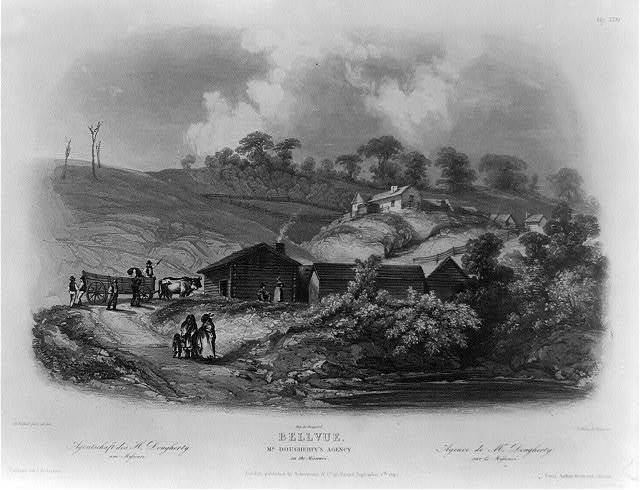This article has been an attempt to explore the founding and early growth of Bellevue, Nebraska on the basis of some new data and, to a degree, upon a reinterpretation of some older material. In certain instances, the result has been a rather radical departure from some earlier presentations. As pointed out in the introduction, this article does not purport to be a final statement, for future research will undoubtedly uncover additional facts that will further clarify and refine the story of these first twenty years.
Bellevue was founded probably during the latter part of 1822 as a field headquarters and trading post of the Missouri Fur Company under the direction of Joshua Pilcher. Two years later financial problems forced a reorganize ti on of the company. It remained under Pilcher’s leadership, but one of the new partners was Lucien Fontenelle, who became one of the most prominent leaders of the Rocky Mountain fur trade and probably Bellevue’s first permanent resident. The reorganized company struggled along until 1828 when it was disbanded and Fontenelle became the owner of the Bellevue post. In 1832 he sold it to the Office of Indian Affairs and moved to a new location a few hundred yards to the south, where he built a new home and trading post which he maintained until his death in 1840. During the last dozen years of his life, Fontenelle was closely associated with the giant American Fur Company and its predecessors.
Shortly after Fontenelle’s death, the post was taken over by Peter A. Sarpy. While this man’s role in early Bellevue has been subjected to various interpretations, there is no doubt that he was a leader in community business and politics by this time and that he maintained this position for more than twenty years until his retirement.
The transfer of the Indian Agency for the Omaha, Pawnee, Oto, and Missouri to Bellevue in 1832 was an important factor in the outpost’s continued development. The Office of Indian Affairs purchased the old Pilcher-Fontenelle post and used it as agency headquarters for about seven years. During this time the agent was John Dougherty. The agency was abandoned, and by 184 1 a new structure had been erected about three-quarters of a mile to the south which served as headquarters for agents until after Nebraska became a territory. By the early forties, the agency employed about a dozen people who Jived with their families at or near Bellevue.
Another less permanent group of Bellevue residents were the contingent of Presbyterian missionaries under John Dunbar. A smaller Baptist mission under Moses Merrill has also been established on the Platte River south of Bellevue. There was undoubtedly a few other people who called Bellevue home, such as employees of the merchants, squatters, or Indian families, but their names have not survived historical records.
When Bellevue reached its twentieth anniversary in 184 2, it was experiencing a period of relative calm. The fur trade was on the decline, and the days when Bellevue served as the “jumping· off place” for the brigades of trappers bound for the Rockies were gone. Dunbar’s missionaries. and many agency employees moved to the Pawnee village, and with Merrill’s death, the Baptist station was abandoned. During the last half of the decade, there was a resurgence of missionary activity and the arrival of Mormon immigrants and other settlers bound for Oregon and California which opened another vigorous chapter in Bellevue’s history. Its renewed growth and increasing importance nearly resulted in its selection as the territorial capital. These events, however, occurred during the years which led to the establishment of Nebraska as a territory and are another chapter in the complex and fascinating history of the states oldest community.
Read the full article here.
Note: the word Indian is used instead of Native American as it was the norm at the time.

Karl Bodmer’s 1833 painting “Bellevue”



